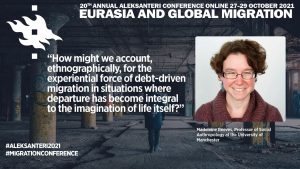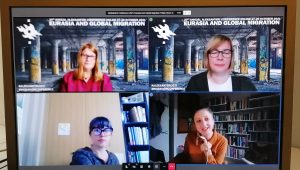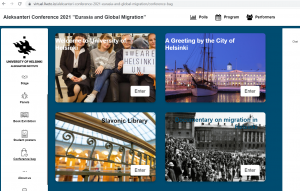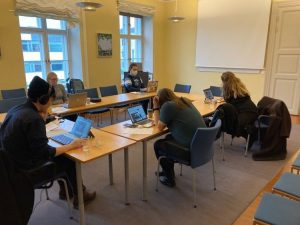On October 27-29, 2021, the Aleksanteri Institute organized its annual multidisciplinary conference on “Eurasia and Global Migration”. Originally planned for October 2020, it had to be postponed to this year because of the restrictions induced by the still ongoing Covid-19 pandemic. The event was held completely online on a platform Liveto (liveto.io), a Finnish company that hosts online events.

This year, the 20th Annual Aleksanteri Conference brought together scholars to explore dimensions of global migration to, from and within the Eurasian space and to discuss these transformations. The conference participants, with different backgrounds and approaches, discussed a broad range of topics pertaining to migration from both historical and contemporary perspectives.

The key note speakers of the conference included Franklin Obeng-Odoom (University of Helsinki, Finland), Caress Schenk (Nazarbayev University, Kazakhstan), Ulf Brunnbauer (Leibniz Institute for East and Southeast European Studies, Germany), Madeleine Reeves (University of Manchester, UK), Marlene Laruelle (The George Washington University, USA) and Teivo Teivainen (University of Helsinki, Finland).
All the key note presentations can be found in the Aleksanteri YouTube channel here.

The online event brought together 263 participants from 39 countries, who explored migration and the agency of migrants in terms of social, political, cultural and historical processes and flows, which redefine the contours of national boundaries and affect societal development in both sending and receiving societies. The organizers had the luxury of putting together a versatile program of high quality panels covering the topic. For more inclusive conference attendance, the online version proved to be a good choice. The conference program is still available at the Institute website, please click here.

The conference was opened by the Minister of Interior, Dr. Maria Ohisalo, who emphasized the political topicality of the conference theme and encouraged researchers to take into account environmental issues linked to migration. During the conference, the Finnish Ministry of Interior, the government agency responsible for regulating migration issues in the country, hosted a workshop on the development of Finland´s migration policy and a round-table titled “Future Perspectives on Migration” with speakers from the Finnish Institute of Foreign Affairs and the University of Eastern Finland. The online conference also featured a series of podcasts – interviews with scholars on the issues related to different aspects of migration and its consequences for Eurasian development from societal, political, cultural and other perspectives. This is a link to the podcast episodes on our website, available with transcripts.

Although the organization of a three day international conference was a major undertaking for the Organizing committee, the end result was a success and worthy of the 20th annual conference. We had wonderful student assistants who worked tirelessly in the Aleksanteri Institute´s premises taking care of the panels.  Participants reacted positively to the conference platform and enjoyed the high level presentations. The original aim of the conference was to demonstrate the relevance of our region of interest (post-Soviet space) for the study of global processes and flows. But the conference also showed the vast number of researchers who work on migration related issues either in cultural, historical, political or societal topics. We are encouraged to build this network also in the future!
Participants reacted positively to the conference platform and enjoyed the high level presentations. The original aim of the conference was to demonstrate the relevance of our region of interest (post-Soviet space) for the study of global processes and flows. But the conference also showed the vast number of researchers who work on migration related issues either in cultural, historical, political or societal topics. We are encouraged to build this network also in the future!
By Sherzod Eraliev
